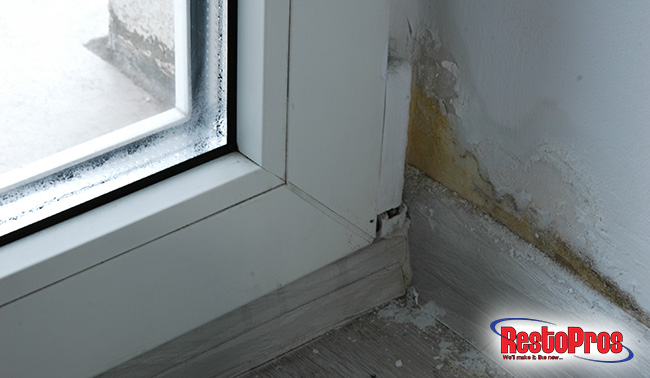Feel like you’re sneezing more than usual? Coughing in the middle of the night? The cause may be more than the weather! If you are looking for one more reason to hate mold, you’ve come to the right place. Mold growth does more than damage your home – it can greatly compromise your health. What you may not notice is the frequency of which mold can impact your health, especially as we leave winter. With spring being right around the corner, Dallas/Ft. Worth homes are at a greater risk of cultivating mold. The experts at RestoPros are here with tips to help identify and treat mold-related allergies.
What Mold Causes Allergies?
Before we continue, we must express that mold is not one specific substance. In fact, it is an umbrella term for many different types of fungi. Some types of mold are relatively harmless (albeit still a nuisance), while others possess allergy-causing effects. Black mold is a good example of a sickness-causing mold and is a known culprit for allergies in the home. Regardless, hundreds of different types of mold can exist in the same area, meaning all mold growth has a chance of causing allergies. But how exactly does it give this effect?
How Does Mold Cause Allergies?
The main goal of mold is to reproduce, but unlike plants, mold does not possess seeds of any kind. Instead, mold produces spores that travel through the air to find their new home. This is one way to cause allergies, as those with a sensitivity to these spores can experience runny noses, irritating eyes, and chronic cough. Mold spores are a known type of aeroallergens.
Spores are not the only way however, as with variations such as black mold, there is the substance known as mycotoxins. Mycotoxins are toxic substances produced by certain types of mold that travel through the air and cause symptoms of allergies. Although earlier we have stated that no scientific conclusion has been made on the actual severity of black mold, symptoms of allergies and sickness are still present from mycotoxins.
The more obvious cause of allergies from mold can also come from general contamination. If you happen to encounter mold via touching or inhaling, then this can cause symptoms of allergies. Mold holds bacteria and pathogens, and while some of them may not be airborne, touching them can give off the same effect.
Is Mold in my Home?
Although allergies can signify mold growth in your home, that’s not the only indication. Here are some additional signs that mold is present in your home.
- Musty and Lingering Smells
- Randomly Appearing Stains
- Moisture Build-Up
- Roof Leakage
- Trash Build-Up
- Fungus Around Your Home
- Previous Flooding
If you have noticed mold in your home, contact RestoPros immediately for mold remediation services.
Preventing Mold?
There are many ways to prevent mold in your home and stop the runny nose from ruining your day. Protect your home from mold by using these tips below!
- Dry Areas as Soon as They’re Wet
- Clean Fabric Stains with Vinegar and Water
- Protect Your Roof from Leakage
- Take out the Trash Regularly
- Fix Plumbing Issues Immediately
- Use Dehumidifier to Prevent Moisture
- Avoid Leaving Wet Clothes in the Dark
- Replace Old Carpet
- Disinfect Cleaning Supplies After Use
- Quickly Remove Mold-Infested Items from Your Home
- Restore Water Damage Immediately
Although we can’t stress enough the importance of mold prevention, we must also advise you on what to do when mold is present in your home.
If you do discover mold, you must contact a mold-removal professional. Mold grows at a rapid rate, and what may seem like a small stain can lead to severe damage to your home, as well as causing sickness. If your home is infected with mold, contact RestoPros immediately. Dallas/Ft. Worth homeowners must be ready to restore their home to a safe environment, and our mold remediation services provide the means to accomplish this at an affordable rate. Give us a call at 855-587-3786 to schedule an appointment with your mold-restoration experts.

